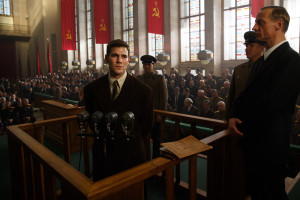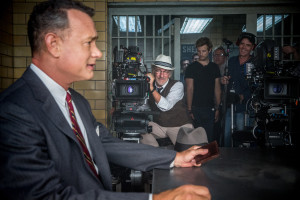Working with director Steven Spielberg was not the only life achievement moment for Bridge of Spies star Austin Stowell. The actor portrays Francis Gary Powers, the U2 pilot who was shot down over the Soviet Union during the height of the Cold War and spent years in a KGB prison. Powers would also be central to a prisoner swap that would be negotiated by lawyer James B. Donovan (Tom Hanks).
We caught up with Stowell for an exclusive chat about the film where he lets The Movie Mensch in on one of the more meaningful aspects of being in Bridge of Spies (one of our 15 fine films of fall), the fact that a whole new generation that might not be so aware of the Cold War might find congruency between what their parents and grandparents lived through and the times that we live in now. Stowell believes that the fear of the world ending that permeated during the Cold War, is still there, but that many live in a “bubble,” completely unaware of the perils of today’s world that match the threats when Soviets and Americans pointed weapons of mass destruction at each other.
Stowell also shares what makes Spielberg such an actor’s director and adds insight into the real Powers that he discovered digging into his harrowing experience.
The Movie Mensch: How familiar were you with Francis Gary Powers, his story, that time, and did you have to dive into that world to get ready to star in Bridge of Spies?
Austin Stowell: I didn’t know him from Adam. I had never heard his story. I jumped in right away. I read his book Operation Overflight and got in touch with his son, Francis Gary Powers Jr., who provided me with hours of interviews that his father had done. I was able to listen to those. I would walk around New York City, walking my dog, listening to Francis Gary Powers talking about the entire account, from the training, the crash, the imprisonment to his release.
The Movie Mensch: Through all that research, was there something about him that surprised you that you didn’t expect to find?
Austin Stowell: [Laughs] Yeah, for a guy that spent three years in a KGB prison and had been regarded as a traitor when he came home, he really had a wonderful sense of humor about the entire situation. He talked with a light heart and didn’t show being spurned by his country.
The Movie Mensch: Those prison scenes are some really tough moments to watch in the film. We live in very fortunate times where not a lot of people have to go through something like that. Was that hard to wrap your head around?
Austin Stowell: You try to relate it to your own life in any way you can. You think about separation. I was a world away from my family and my friends and my comfort zone. Once you find that feeling, and explore that feeling and let it consume you, you can wrap your head around the mind frame that Powers might have been in. Of course, I am not saying I know what it’s like to go through a plane crash, but I certainly know what it’s like to long for home, but also to realize that you are part of something bigger than yourself.
The Movie Mensch: We all know about the filmmaker extraordinaire that is Steven Spielberg. His talent for the visual and as a storyteller is well documented. But, he’s also worked with some of the most talented actors in the world over the last few decades. As an actor, what most impressed you about Mr. Spielberg?
Austin Stowell: His ability to make you feel comfortable and trust him so quickly and to not feel self-conscious. He understands who he is. That’s one of his major talents. He’s there for the story. He’s there to give the audience the ride that is in his mind and he’s excited to do it. To be one of the working parts of that ride to create with him, it’s an unbelievable experience. Tom Hanks said it best at the premiere, “You never want to be making your last Steven Spielberg film.” I share that sentiment.
The Movie Mensch: As the Cold War gets further and further away, I think Bridge of Spies is an important film. We forget how close we came on many occasions to the end of the world. Why do you think it’s important for young people to see this film and what do you hope audiences get out of it?
Austin Stowell: I think it has a lot of parallels to what we see today. If people were scared back then, there are some issues going on right now, there’s a lot of people out there now with buttons they could press to do some major destruction. A lot of people live their lives in this haze and blissfully unaware of the reality that is going on and I think we can heighten that tension and make people more cognizant that this could be a reality in our lifetimes. It will be help and it is helping my generation. We don’t share the same ideas as our grandparents and their parents felt. We think that it’s a more peaceful world. I think this film is going to allow people to bring up that topic of conversation and allow that conversation and alleviate more of the distance between reality and this bubble we live in.




